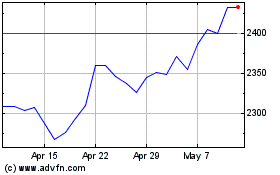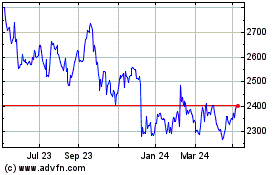Biden Administration Resparks an Old Danger for Cigarette Stocks -- Heard on the Street
April 20 2021 - 10:07AM
Dow Jones News
By Carol Ryan
U.S. cigarette companies are caught between hawkish regulators
and the scarring experience of Marlboro-maker Altria's disastrous
investment in vaping brand Juul. What is surprising is that this
predicament still has the capacity to catch investors off
guard.
On Monday afternoon, The Wall Street Journal reported that the
Biden administration is considering tighter tobacco regulations.
The trigger is a petition that the U.S. Food and Drug
Administration must respond to later this month, stating whether or
not it plans to ban menthol cigarettes. The White House is also
weighing whether to reduce the nicotine content of cigarettes to
make them less addictive.
On Tuesday, Altria fell 6% at the open, having already lost 6%
shortly before the Monday close. Europe-listed peers British
American Tobacco and Imperial Brands dropped 7%. Philip Morris
International, which controls Marlboro overseas, has been less
impacted. The company spun out its American business -- now Altria
-- in 2008 precisely to fend off this kind of risk.
Investors now dumping tobacco stocks have been complacent. The
dangers of a menthol ban and lower nicotine levels have been around
since mid-2017, and the Democrats are traditionally more hawkish on
tobacco regulation. In the latest election cycle, two-thirds of all
cigarette industry donations went to the Republicans, data from
lobbying monitor OpenSecrets shows.
Some may have been lulled into believing that the issue had
slipped down the political agenda after a period of calm. This was
the first strong indication of the Biden administration's
intentions. And the tobacco business has fared well during the
pandemic: U.S. cigarette volumes were flat in 2020 for the first
time in years.
Cigarette companies can delay implementation for several years
by dragging any fresh rules through the courts. The bar for new
regulations also is high: The FDA must have science to prove that
the changes will benefit public health and not simply push demand
underground.
Still, the companies with most to lose from tougher regulation
have made little progress in managing the risk. In 2020, Altria
made 88% of net revenue from smokable products, just 1 percentage
point less than in 2017. The tobacco giant's $13 billion investment
in Juul Labs in 2018 is now worth just $1.6 billion, after several
write-downs.
British American Tobacco made a different kind of bad bet with
its almost $50 billion buyout of Reynolds American in 2017. It
makes more than four-fifths of overall sales from old-school
cigarettes, including through Reynolds's big menthol business,
although its exposure to the U.S. market is lower than
Altria's.
The news will likely sharpen investors' existing bias toward
tobacco companies that have large smokeless portfolios, such as
Swedish Match. Among the industry's giants, the irony is that the
company most insulated from the U.S. regulatory problems has the
most promising transition plan: Philip Morris, which reported
quarterly results Tuesday, said smokeless products like its IQOS
heated tobacco sticks generated 28% of sales over the three months
through March. The stock's forward earnings multiple was just 7%
higher than Altria's when the two split; now the premium is
42%.
To narrow the gap, Altria and British American need to double
down on smokeless products without being panicked into overpaying
for the next Juul. It isn't an easy task, nor a new one, but the
Biden administration's emerging stance underlines how necessary it
is.
Write to Carol Ryan at carol.ryan@wsj.com
(END) Dow Jones Newswires
April 20, 2021 10:52 ET (14:52 GMT)
Copyright (c) 2021 Dow Jones & Company, Inc.
British American Tobacco (LSE:BATS)
Historical Stock Chart
From Mar 2024 to Apr 2024

British American Tobacco (LSE:BATS)
Historical Stock Chart
From Apr 2023 to Apr 2024
